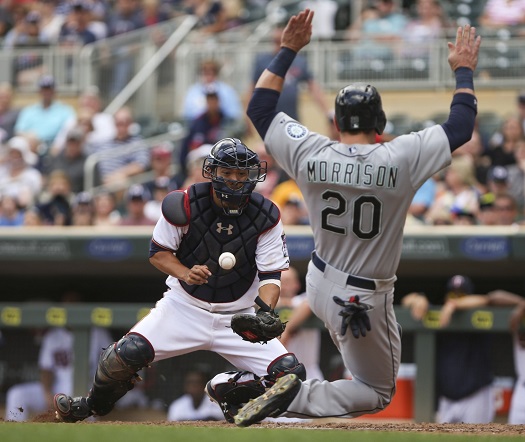
The Mariners did something this afternoon they haven’t been doing much lately. They won a game.
Even more surprisingly, they won the game by more than a single run. The final score was 4-1 in their favor. Less surprisingly, it took them 11 innings to get there.
Those of you who read my baseball posts or follow baseball more generally may recall that while the M’s wound up one game shy of the playoffs last year, they had the statistically most exciting regular season last year, by a wide margin, as I ruminated on last October. This year, they’ve captured an almost dominating penchant for a different kind of baseball excitement than being close to the playoffs, and one that makes each inning even more engaging: close games.
The Mariners have played 39 one-run games this year, the most in the American League and third-most in baseball. That represents fully 37% of their season being games decided by the closest possible margin. Today’s game was their 15th extra-inning game, also the most in the AL and tied for the most in baseball. They are 20-19 and 8-7 in these two categories respectively, making such close contests basically toss-ups when the M’s play them, better odds than their .453 winning percentage overall (and way better than, say, their .418 winning percentage in games decided by more than one run). No one in the AL has won more 1-runners and only two teams have lost more (the A’s being notably hapless with a 10-25 1-run mark which will both underscore the near-miss potential of “moneyball” and make Oakland fans resentful of any kind of “how close we could have been” message I give the M’s from this post).
By the standard metrics of excitement per game, of memorably close game, the Mariners are at the top. But what happens when we drill a little bit deeper into the data?
The Mariners have been involved in 12 walk-off games (those ending in the very last at-bat), winning 5 and losing 7. For context, they were 2-6 in such contests all of last season (8 games total of 162, contrasted with 12 this season in just 106 so far). Less than a week into the season, they played four straight one-run games, the first three of which also went into extra innings and the last two of which were walk-off losses. In the middle of last month, they again played four straight one-run contests, with the fifth right after being a wild 11-9 win in which they overcome an 8-6 deficit in the top of the 8th with a pinch-hit grand-slam by Franklin Gutierrez, in easily the most exciting pitch of my Mariner fandom this year. I was jumping around the room and scared our rabbit, who has little appreciation for baseball, and the game’s 20 runs and 26 hits took four hours and felt longer than most extra-inning games, coming down to as close a game as a two-run contest can be. They’ve played 21 2-run games (at a disappointing 7-14 clip) and 13 3-run games (much better at 8-5). While they’ve been outscored by 58 runs total in 106 games, they’ve been outscored by just 4 runs total in the 73 of them that have been decided by 3 runs or less. Meaning the remaining 33 have carried a 54-run deficit, in which their record is 13-20. Three of those have been wrenching double-digit losses. Their largest margin of victory, on the other hand, is 7.
I don’t have enough data in front of me to know how some of this compares to other teams or other seasons, but I’ve spent enough years as a fan to know that most baseball isn’t this close, at least not this consistently. Of course, one of the greatest aspects of baseball is its lack of clock and the fact that no game is ever truly over till the last out is recorded. One’s theoretical chance of coming back to win is always in play until this happens, unlike timed games where victory is often long beyond physical reach before their conclusion. There is no being 25 points down with one minute to play in baseball. You may be down 10 runs with one out to go, but people have come back from that kind of deficit before, which can not be said of insurmountable timed leads in basketball, football, soccer, and hockey.
The end result of all this is that while the Mariners languish 10 games below .500 and 12 games out of first place, they feel like they’re in it. Every game is going to go the full nine, maybe the full eleven or twelve, and it seems that, punctuated by a couple embarrassing blowout losses, just about every game is going to be a nail-biter, ending in tragedy or triumph, and often a string of alternating tragedies and triumphs as we match the other team run for run. It is this exactitude, this playing to precisely the level of the other team whether it’s in hitting or pitching or both, that is so confounding about the 2015 Mariners, and simultaneously makes them so entertaining to watch. They did things like winning exactly every other game during the first 12 days in July, going 6-6 without ever doing the same thing in back-to-back contests. After that, they didn’t compile more than a 2-game streak in either direction till a rare sweep loss to Arizona in which only one game was a 1-runner. It was also an extra-inning game, the night after an extra-inning one-run walk-off.
How can you not want to watch this, even if it mostly ends the same way the last 13 seasons of Mariners baseball have, outside the playoffs?
Part of this, of course, is augmented by an irrationality that I think is almost unique to Mariners fans who were avid in the 1995 season. After our first playoff year ever as a franchise (after an 0-18 start in seasonal attempts) came from an unthinkable comeback in the standings, down 11.5 games on August 24th and coming all the way back to force a one-game playoff for the Division title with the Angels, every Mariners deficit seems possible to overcome. The spirit of Refuse to Lose has never left Mariners fans, so we can look at a 12-game deficit in early August and say “meh”. It’s utterly nuts, to make every season into 1995 in our imaginings, a year when the Mariners went 25-11 in their last 36 games, then won a one-game playoff 9-1, then came back from 0-2 in the ALDS to win 3-2. But for me, for I suspect most long-term Mariners fans, we see the glint of ’95 in every shortfall. We are the worst kind of incorrigible optimists, able to make hope out of the feeblest of circumstances. Excitement like that found in each game this year sure doesn’t help.
I have often pondered the role of sports in our lives, as irrational and control-ceding and time-wasting as they can be. But one of the things they add to our lives, for those of us who let ourselves truly care about the teams and their outcomes, is a level of drama, thrill, and uncertainty that is rarely found in the other routines of our modern existences. When it is found, it is often all too real, the drama of a near-miss car accident or the uncertainty of the fate of a loved one. Sports, like amusement parks, offer people a chance to safely let themselves experience these ups and downs, to get emotional over things that are not, ultimately, life and death. And while every sports fan will tell you that what they most want for their team is a championship, there’s something to be said for the excitement along the way. A championship is just a moment, but nail-biting see-sawing one-run games are a little version of that kind of moment, over and over again. Tune in tomorrow night for more lead changes, blown saves, 9th inning homers, and an outcome as unpredictable as life itself.


